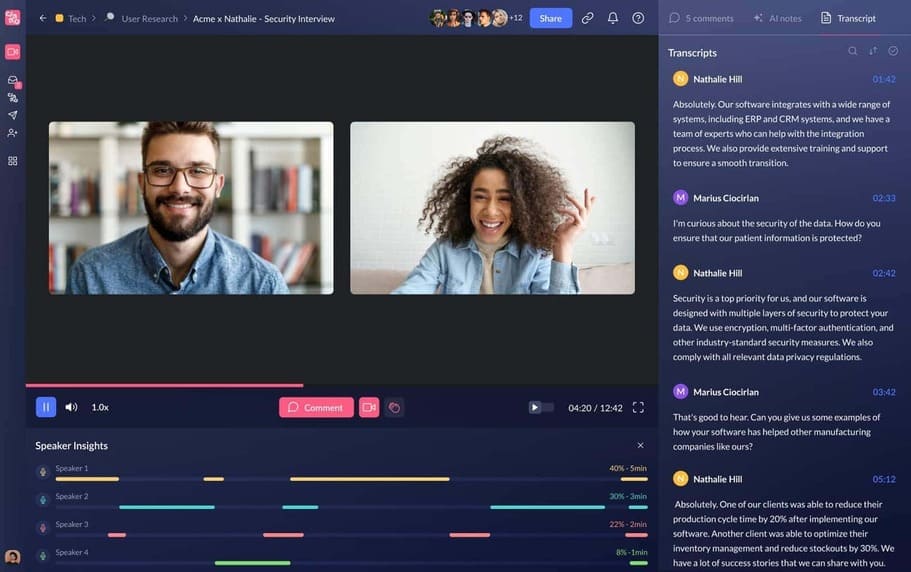What should you look for in a Tech Lead candidate?
What are the responsibilities of a Tech Lead?

If you’re here, you certainly are looking for advice before interviewing Tech Lead candidates. Whether you have some knowledge on the job or not, you should start by defining precisely the role of a Tech Lead. Let’s do it together! A Technical Leader (Tech Lead) is responsible for:
- Leading the Tech Team: The Tech Lead, as the name suggests, is in charge of leading the Tech Team. He/she is generally the most experienced person in the team and is able to delegate the work efficiently and help the team with technical issues and challenges.
- Reviewing the technical architecture of projects: The Tech Lead is responsible for designing and reviewing the technical architecture of projects.
- Communicating with other teams: The Tech Lead needs to be able to bridge between the Tech team and other teams. He/She is the point of contact for other teams and is in charge of explaining technical concepts to non-technical stakeholders.
Maybe you already knew that. But you need to keep it in mind. Because this is how you’ll know a candidate is the right one.
How to find the ideal Tech Lead candidate?

We just mentioned what a Tech Lead is responsible for. You must base yourself on that to find the right candidate. But how? You can’t just give him/her the reins of the Tech Team to see how he would do! You need to think of qualities, skills to evaluate. Hopefully I’m here to assist you and I even already thought about that:
- Leadership and management skills: The candidate should have strong leadership traits. A strong candidate will be able to show his/her management techniques and attest to it with a track record.
- Problem-solving and technical skills: Don’t forget that the Tech Lead is a technical profile! The candidate needs to demonstrate strong problem-solving and coding skills to review the code produced by his/her teammates.
- Communication skills: The ideal candidate will demonstrate he/she has top communication skills and is able to convey ideas effectively with teammates but also with non-technical stakeholders.
Now you have a very strong basis to evaluate your candidates. But I know you want more! That’s why you’re here! And to be properly prepared before interviewing a Tech Lead candidate, you still need one thing: a scorecard template!
How to craft your Tech Lead scorecard template?

Why do you need a Tech Lead scorecard template?
Just before we move on to actually crafting our scorecard template, let me highlight the benefits of using such a support tool:
- Staying organized: Let’s recap: you need to evaluate a candidate on specific skills/qualities. For that, you can write the areas you want to evaluate on a paper sheet or a Word document. But it’s not ideal… Writing the areas/questions on a simple document that is optimized so you can directly put the answers of the candidate and assess his/her performance would be way better, right? This is exactly what a scorecard template is for!
- Choosing the right candidate: The main utility of a scorecard template is scoring candidates. This helps you make an objective choice and find the right candidate. You attribute a score for each area/question you evaluate. Then, based on the weighting of all these factors, you obtain a general score that should accurately reflect the candidate’s performance. Finding the best candidate is easy then!
- Keep track of the interview: During the interview, you’ll fill your scorecard template with the information you need to evaluate the candidate: answers, feedback, score… Then, coming back to your scorecard is a pretty good way to keep track of your interview! And you can even use Claap to store and find your past interviews in a breeze!
Building your Tech Lead scorecard template step by step

I’ll not make you wait any longer, let’s craft this Tech Lead scorecard template together. First, you need to know what kind of scorecard template you want. You can either choose the general version where you will evaluate general areas/topics (eg: you’ll just have a “communication” area and evaluate it in your own way) or the “questions” version, which guides you through your interview with exactly the questions you need to ask.
Once you’ve made your decision, you need to take a standardized scorecard template. And don’t worry, no matter what your choice is, you can find one here.
If you’ve chosen the general version, you can replace the “Areas to evaluate” with the actual areas you want to evaluate. Here, you’ll have 3 areas: Leadership and management skills, Problem solving and technical skills and Communication skills.
If you’ve chosen the “questions” version, we’ll have a bit more work together as you’ll need to find questions to put in your template. You can ask general questions about the candidate and one or several questions for each of the 3 areas to evaluate. Of course I’ll help you find the best questions, you just need to select them from the following list!
28 Tech Lead interview questions

General questions:
- Could you go through your resume and detail your tech background?
- Why are you interested in this position?
- Give me a piece of feedback you’ve received from your previous employer.
- How did you decide to get into programming?
- What do you like about programming?
- What is your ideal work environment?
Leadership and management skills:
- Tell me about the teams you managed in your previous experiences.
- What makes you a good leader?
- Can you share an example of a challenging situation with your team and how you navigated through it as a leader?
- How do you motivate your teams?
- How would you describe your management style?
- How would you assess the success of your teams?
- How would you delegate tasks among your team?
- What strategies do you use to promote continuous learning and skill development within your team?
Problem-solving and technical skills:
- How do you conduct code reviews to ensure high-quality code?
- Can you share an example where your code review process improved code quality?
- Describe a challenging technical issue you resolved. How did you troubleshoot and address it?
- How do you prioritize and address technical issues under time constraints
- How do you stay updated on emerging technologies to enhance your problem-solving skills?
- Share a situation where you had to make a trade-off between quick and comprehensive solutions.
- Walk us through your approach to writing clean and maintainable code.
- Can you share a project where your coding skills contributed to success?
Communication skills:
- How do you handle conflicts or disagreements within your team?
- Describe a situation where you successfully collaborated with a non-technical team to achieve a common goal. How did you bridge the communication gap?
- In what ways do you tailor your communication style when interacting with different stakeholders, both internal and external?
- How do you approach explaining technical concepts to non-technical stakeholders?
- How do you ensure that your audience comprehends the technical information you convey?
- Can you provide an example of a time when you successfully made a complex technical concept understandable to a non-technical audience?
Sample answers

- How would you delegate tasks among your team?
Sample Answer: "When delegating tasks among my team, I prioritize understanding each team member's strengths, weaknesses, and interests. I believe in setting clear objectives and expectations for every task, ensuring alignment with individual skills and project goals. Encouraging autonomy and ownership fosters a sense of accountability and promotes creativity. Collaboration is key, as it enhances team dynamics and facilitates knowledge sharing. Monitoring progress, providing support, and offering feedback are essential for ensuring smooth execution and continuous improvement. Ultimately, my goal is to empower team members, foster collaboration, and drive project success."
- Walk us through your approach to writing clean and maintainable code.
Sample Answer: "When writing code, I prioritize readability and simplicity. I follow established coding standards and conventions to ensure consistency. Using self-documenting code with clear variable and function names, I aim to make the code understandable without excessive comments. Breaking down tasks into smaller, focused functions or methods makes the code easier to understand, test, and debug. I believe in minimizing complexity and favor straightforward solutions over convoluted ones. Error handling is crucial for robustness. I implement comprehensive error handling and validation to handle unexpected scenarios gracefully. Automated testing, including unit tests and integration tests, helps ensure code reliability and catches bugs early. Regular refactoring is also essential for improving code quality and adapting to changing requirements."
- How do you ensure that your audience comprehends the technical information you convey?
Sample Answer: "In ensuring comprehension of technical information, I tailor my communication to the audience's expertise. I use clear language, avoiding jargon, and incorporate visual aids like diagrams to enhance understanding. Providing real-world context and encouraging interaction helps gauge comprehension and address questions promptly. Breaking down information into smaller, digestible parts and offering practical examples reinforces learning. Lastly, I seek feedback to refine my approach for future interactions."
How using Claap can make your interview process even easier?

Being myself an interviewer, I can tell you that using a scorecard template will multiply your productivity. But the real game changer is Claap. Claap is an audio and video transcription tool that makes your whole interview process a lot smoother. Here is why.
Claap takes notes for you

Claap is an automatic notetaker. It transcribes your entire interviews so you don’t have to take notes!
This feature makes Claap so efficient to use with your Tech Lead scorecard template as you can 100% concentrate on the performance of your candidate, and on the score you attribute. Claap also automatically summarizes the notes it takes and even fills your personal template using its AI features!
Claap records your interviews
The first thing Claap can do is record your meetings. You don’t have to worry about keeping track of your interviews when you literally have the whole interview recorded, right?
And Claap also makes your past interviews management way easier: with its video library, it stores all your past interview recordings and the notes associated. Then you can use any word pronounced during an interview to find it back! No more long hours searching for an interview report!

Claap rethinks your interview process
Claap allows you to make your interview process more collaborative. As they say, unity is strength and it’s true for interviews as well!
With Claap’s workspaces, you can easily share your recorded interviews to the people you want: HR, other interviewers, anything is possible! You can justify a decision, ask for validation, collect feedback and many other things that make your interview process fairer and more objective!
But to understand the extent of Claap's capabilities, there's nothing better than trying it out, so don't wait any longer and do it now!
FAQ






